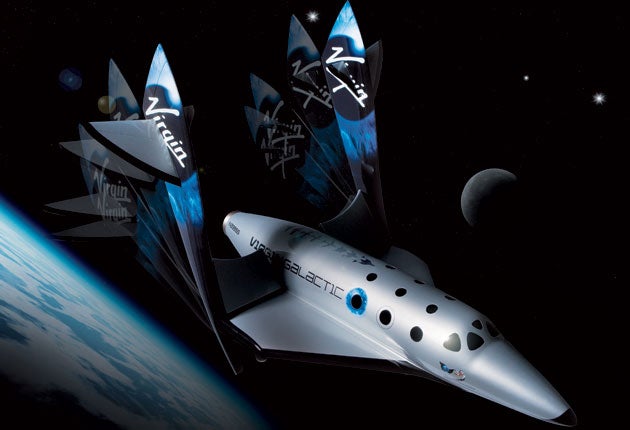Ready to boldly go where no tourists have gone before?
Start the countdown: the next jet-set era will be launching sooner than expected. Martin Hickman on the rush to venture into space

The reality of using space ships as we do passenger jets is merely a few years away, according to independent space agency analysts. Commercial operators are now locked in a private space race to operate scheduled services to the outer reaches of the Earth's atmosphere. Hundreds of wealthy entrepreneurs, celebrities and scientists have already booked tickets for the first flights by Sir Richard Branson's VirginGalactic space tourism business, which are predicted to be cleared for take-off in the next two years. Its new runway in New Mexico opened at the weekend.
Professor Richard Crowther, Technical Adviser to the UK Space Agency, predicted that future space missions would become a lot more regular and a lot cheaper.
"It will be very expensive to start off with, but the technology that will then develop will open up space to everybody," he told The Independent.
"You can imagine the early days of aviation, where very people went on aircraft, but now it's mass market. I suspect a mass market in taking people into space will be a long time coming, but the costs should fall with new craft."
Fewer than 500 people have flown into space onboard craft operated by Russia, the US and China. With the Cold War over, the US and Russia have lost the incentive to pour billions into space programmes and in February US President Barack Obama cancelled a Nasa project to the Moon, saying it was was too expensive and lacking in innovation.
But while the superpowers have stepped back, commercial concerns have moved in. One of them is Virgin Galactic, founded by the entrepreneur six years ago. Another is Blue Origin, started by Amazon creator Jeff Bezos. Blue Origin says it is developing a rocket-propelled vehicle – the New Shepard – to "routinely fly multiple astronauts into suborbital space at competitive prices".
Another company, Space Adentures arranged for seven multi-millionaires to live on the Russian Soyuz space station for up to 15 days, paying $20m each.
According to VirginGalactic, 380 people have booked tickets on its VSS Enterprise at $200,000 a time. They include physicist Professor Stephen Hawking, climate change scientist James Lovelock, singer Sarah Brightman, comedian Russell Brand, designer Philippe Starck, Paypal founder Elon Musk and ex-Dallas actress Victoria Principal. Other travellers will be millionaire property developers, the Candy brothers. Nick Candy, who has brought three tickets so far – one for him and two as gifts for his brother Christian and Christian's wife Emily Crompton – said one of the advantages was that, unlike state astronauts, he would not have to undertake months of training.
"You will probably be weightless for six minutes. You will see the whole of Planet Earth. I have had some amazing experiences and hopefully this will be another one," he said.
He added: "Richard [Branson] and I are very close. He will make sure every test in the book has been passed. It's amazing a British brand like Virgin is doing this."
Virgin said space tourism had allowed scientific breakthroughs to take place without state subsidy. Existing spaceships were based essentially on Nazi V2 rocket techology, but Virgin's spacecraft was "a resuable system with minimal impact".
"There is a very low environmental impact," said Will Whitehorn, _Virgin Galactic's President. "We will, in a 10 year programme, fly tens of thousands of people into space with less impact than one Shuttle."
The flights will also be much cheaper: around £1m per flight, compared with £1bn for a US space shuttle flight. The reason is that the craft are much lighter than Nasa spaceships and can be re-used. A mothership, White Knight Two, made of lightweight carbon composite and powered by biobutanol, will carry the space rocket 10 miles high. The six-seater craft will then be thrust into space, fulled by nitrous oxide and recycled nylon, before gliding back to Earth in New Mexico.
Mr Whitehorn denied reports that the price would fall to $20,000. "I wouldn't think we will ever get it that low," he said, adding that it would become much cheaper than $200,000. "We hope within five or six years to get the price down to considerably lower than that; certainly below $100,000 after five or six years."
Professor Crowther said space tourism would benefit science by allowing experiments to be conducted on the Earth's upper atmosphere, cheaply, by "piggy-backing" commercial flights – which might help in the fight against climate change.
"It's a real market; it's a real technology. I think you have to see it in terms of the early aviation systems," he said. Asked if mass space tourism would take off, Mr Whitehorn said: "Yes. I really do and I think it's going to be very important to achieve.
"Only 500 people have been in space. We are going to carry more than that in year one. This will herald an industrial revolution in space."
So who has booked already?
Christian and Nick Candy
James Lovelock
Philippe Starck
Stephen Hawking
Sarah Brightman
Victoria Principal
Paypal founder Elon Musk
Join our commenting forum
Join thought-provoking conversations, follow other Independent readers and see their replies
Comments
Bookmark popover
Removed from bookmarks